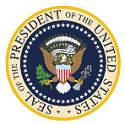 01/24/2017 - AHF submits letter to President Trump on improving American-Hungarian relations and urging his Administration to adopt a new approach to our bilateral relations with Hungary. The letter noted, "misunderstandings have resulted in flawed and self-defeating policies that tend to foster disillusionment with the U.S. among Hungarians and thereby damage U.S. strategic interests." 01/24/2017 - AHF submits letter to President Trump on improving American-Hungarian relations and urging his Administration to adopt a new approach to our bilateral relations with Hungary. The letter noted, "misunderstandings have resulted in flawed and self-defeating policies that tend to foster disillusionment with the U.S. among Hungarians and thereby damage U.S. strategic interests."
The letter appears in full-text below and available for [download]
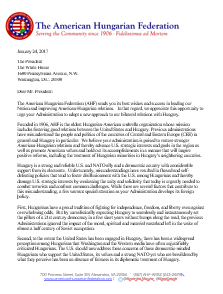 |
The AHF Letter to President Trump is available for download:
English  |
January 24, 2017
The President
The White House
1600 Pennsylvania Avenue, N.W.
Washington, D.C. 20500
Dear Mr. President:
The American Hungarian Federation (AHF) sends you its best wishes and success in leading our Nation and improving American-Hungarian relations. In that regard, we appreciate this opportunity to urge your Administration to adopt a new approach to our bilateral relations with Hungary.
Founded in 1906, AHF is the oldest Hungarian-American umbrella organization whose mission includes fostering good relations between the United States and Hungary. Previous administrations have misunderstood the people and politics of the countries of Central and Eastern Europe (CEE) in general and Hungary in particular. We believe your administration is poised to restore stronger American-Hungarian relations and thereby advance U.S. strategic interests and goals in the region as well as promote American values and hold out its accomplishments in a manner that will inspire positive reforms, including the treatment of Hungarian minorities in Hungary’s neighboring countries.
Hungary is a strong and reliable U.S. and NATO ally and a democratic country with considerable support from its electorate. Unfortunately, misunderstandings have resulted in flawed and self-defeating policies that tend to foster disillusionment with the U.S. among Hungarians and thereby damage U.S. strategic interests by weakening the unity and solidarity that today is urgently needed to combat terrorists and confront common challenges. While there are several factors that contribute to this misunderstanding, a few warrant special attention as your Administration develops its foreign policy.
First, Hungarians have a proud tradition of fighting for independence, freedom, and liberty even against overwhelming odds [1944, 1848, 1956]. But by unrealistically expecting Hungary to seamlessly and instantaneously set the pillars of a 21st century democracy in a few short years without bumps along the road, the previous Administrations ignored the impact of the moral, spiritual and material wasteland left in the wake of almost a half century of Soviet occupation.
Second, to the extent the United States has been engaged in Hungary, there has been a widespread perception among Hungarians that Washington and the Western media have often unjustifiably criticized Hungarians. The U.S. should now address these concerns of those democratic-minded Hungarians who support the United States, its values and a strong NATO yet who are bewildered by what they perceive has been an absence of fairness in its diplomatic treatment of Hungary.
There is a chance, however, that if the U.S. fails to dispel the perception of unfairness, these disappointed long-time friends of America may adopt more cynical anti-Western attitudes and thus weaken the alliance contrary to U.S. geo-strategic interests.
Third, there has been a tendency by U.S. officials to repeatedly and publicly criticize and lecture Hungarians in a patronizing and humiliating manner. The lectures even extend to questions that are truly internal matters, such as the debates among Hungarians regarding their history.
The impact of this unproductive and undiplomatic approach on Hungary and its current political environment must, we respectfully submit, be taken into consideration if the United States is to fine-tune and develop sound and effective relations with Hungary. Promoting an understanding of American values and its accomplishments without blatantly interfering in Hungary’s internal matters would advance U.S. interests and policy goals in the region and reestablish strong bilateral ties, thereby strengthening NATO and inspiring positive reforms in the region.
Thank you for considering our views, and we look forward to working with your Administration to advance U.S. interests in CEE and Hungary. We would appreciate meeting with your advisers at their earliest convenience to discuss these important matters.
Most respectfully,
Akos L. Nagy
National President
Frank Koszorus, Jr.
Chairman, Board of Directors
Public Member of the U.S. Delegation of the
1989 Conference on Security and Cooperation
in Europe on the Human Dimension
Join and Support Us Online!

[<< Back to All AHF News]
| Related Articles
 02/08/2017 - AHF continues its 02/08/2017 - AHF continues its
outreach to the
new administration, submits letter to Secretary of State Tillerson urging the United States to adopt a new approach to bilateral relations with Hungary. The letter urges the administration to "advance U.S. strategic interests and goals in the region as well as promote American values and hold out its accomplishments in a manner that will inspire positive reforms, including the treatment of Hungarian minorities in Hungary’s neighboring countries. [read more]
 10/10/14 - AHF submits letter to President Obama: "...although we believe that vigilance is necessary to preclude backsliding when it comes to democracy, we are justifiably puzzled and deeply concerned that you lumped Hungary in with Egypt and some of the worst dictatorships of the world in assessing the state of civil society freedoms. We... respectfully call upon you to retract that part of your statement that unjustifiably places Hungary in the same category with Egypt and other such repressive countries. Doing so would help alleviate the concern, confusion and disbelief found in our community about the United States views of Hungary, a democratic ally. It would also serve to advance the goals of the United States in the region." [read more] 10/10/14 - AHF submits letter to President Obama: "...although we believe that vigilance is necessary to preclude backsliding when it comes to democracy, we are justifiably puzzled and deeply concerned that you lumped Hungary in with Egypt and some of the worst dictatorships of the world in assessing the state of civil society freedoms. We... respectfully call upon you to retract that part of your statement that unjustifiably places Hungary in the same category with Egypt and other such repressive countries. Doing so would help alleviate the concern, confusion and disbelief found in our community about the United States views of Hungary, a democratic ally. It would also serve to advance the goals of the United States in the region." [read more]
 10/22/14 - AHF submits letter to US Asst. Secretary of State Victoria Nuland: "The appearance of selective enforcement and the use of anti-corruption measuresas a “big gun” for political purposes that are unrelated to corruption, coupled with the other issues noted in this letter merely befuddle and alienate the Hungarian people and undermine U.S. goals...Corruption cannot, must not be tolerated. It needs to be eradicated wherever found. If not halted, it will undermine democracy and the free market system. We, therefore, support U.S. anti-corruption initiatives. However, in order to be effective, selective prosecution should be meticulously avoided." [read more] 10/22/14 - AHF submits letter to US Asst. Secretary of State Victoria Nuland: "The appearance of selective enforcement and the use of anti-corruption measuresas a “big gun” for political purposes that are unrelated to corruption, coupled with the other issues noted in this letter merely befuddle and alienate the Hungarian people and undermine U.S. goals...Corruption cannot, must not be tolerated. It needs to be eradicated wherever found. If not halted, it will undermine democracy and the free market system. We, therefore, support U.S. anti-corruption initiatives. However, in order to be effective, selective prosecution should be meticulously avoided." [read more]
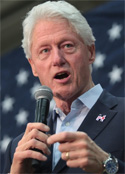 5/18/2016 - AHF and PAC address Bill Clinton's Hungary remarks: The Presidents of the American Hungarian Federation and the Polish American Congress issue a joint statement objecting to the collective characterization by former President Bill Clinton of the Hungarian and Polish people as tired of democracy and desirous of “authoritarian dictatorship.” [read more] 5/18/2016 - AHF and PAC address Bill Clinton's Hungary remarks: The Presidents of the American Hungarian Federation and the Polish American Congress issue a joint statement objecting to the collective characterization by former President Bill Clinton of the Hungarian and Polish people as tired of democracy and desirous of “authoritarian dictatorship.” [read more]
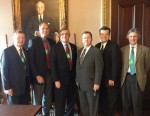 11/14/14 - AHF meets with National Security Council and State Department Officials - On Friday, November 14, 2014, Frank Koszorus, Jr., President of the American Hungarian Federation, and Paul Kamenar and Imre Nemeth, members of the Federation's International Relations Committee, met with Nathaniel Dean, Director for Central and North European Affairs at the National Security Council, Thomas O. Melia, Deputy Assistant Secretary of State, and Ivan Weinstein, Desk Officer for Hungary at the Department of State. [read more] 11/14/14 - AHF meets with National Security Council and State Department Officials - On Friday, November 14, 2014, Frank Koszorus, Jr., President of the American Hungarian Federation, and Paul Kamenar and Imre Nemeth, members of the Federation's International Relations Committee, met with Nathaniel Dean, Director for Central and North European Affairs at the National Security Council, Thomas O. Melia, Deputy Assistant Secretary of State, and Ivan Weinstein, Desk Officer for Hungary at the Department of State. [read more]
 1/20/2015 - Politics.hu publishes Op-Ed by AHF President, Frank Koszorus, "What is the endgame for U.S.-Hungarian relations?"In a Tweet on January 12, 2015, US Embassy Charge d’Affaires Andre Goodfriend quoted Stephen I, the first king of Hungary (975–1038), who urged his son Emeric to welcome foreigners.The Tweet...clearly made in response to the Hungarian Prime Minister's recent policy statement... that Hungary and Europe 1/20/2015 - Politics.hu publishes Op-Ed by AHF President, Frank Koszorus, "What is the endgame for U.S.-Hungarian relations?"In a Tweet on January 12, 2015, US Embassy Charge d’Affaires Andre Goodfriend quoted Stephen I, the first king of Hungary (975–1038), who urged his son Emeric to welcome foreigners.The Tweet...clearly made in response to the Hungarian Prime Minister's recent policy statement... that Hungary and Europe  should, with the exception of political asylum, curb economic immigration. should, with the exception of political asylum, curb economic immigration.
[read more]
 1/15/2015 - Federation leaders meet with new US Ambassador to Hungary Colleen Bell and Hungarian Desk Officer Ivan Weinstein. The meeting took place at the State Department and was intended to review American / Hungarian bilateral relations with Ambassador Bell as she prepares to take up her post in Budapest shortly.
[read more] 1/15/2015 - Federation leaders meet with new US Ambassador to Hungary Colleen Bell and Hungarian Desk Officer Ivan Weinstein. The meeting took place at the State Department and was intended to review American / Hungarian bilateral relations with Ambassador Bell as she prepares to take up her post in Budapest shortly.
[read more]
 12/17/14 - AHF Meets with Kathy Kavalec, Director, U.S. Department of State, Office of Russian Affairs: On December 17, AHF met with Kathy Kavalec, Director, U.S. Department of State, Office of Russian Affairs, to discuss Russia's policies and activities in Central Europe, including Hungary, and U.S. response thereto. "Our Federation believes that good bilateral relations between the United States and Hungary and a strong and united NATO are in the interest of both countries and necessary to meet the formidable challenges posed by Russia in the region," said the Federation's president Frank Koszorus, Jr. "Winning instead of alienating public opinion is critical to advance these goals," he added. 12/17/14 - AHF Meets with Kathy Kavalec, Director, U.S. Department of State, Office of Russian Affairs: On December 17, AHF met with Kathy Kavalec, Director, U.S. Department of State, Office of Russian Affairs, to discuss Russia's policies and activities in Central Europe, including Hungary, and U.S. response thereto. "Our Federation believes that good bilateral relations between the United States and Hungary and a strong and united NATO are in the interest of both countries and necessary to meet the formidable challenges posed by Russia in the region," said the Federation's president Frank Koszorus, Jr. "Winning instead of alienating public opinion is critical to advance these goals," he added.

Amerikai levél Orbánékról - erről nem beszélhettek a diplomaták: A legnagyobb amerikai magyar szervezet, az Amerikai Magyar Szövetség fordult levélben Victoria Nuland helyettes külügyi államtitkárhoz. [tovább]
 5/9/2014 - AHF Submits Letter to Secretary of State John Kerry expressing concern that the US Embassy's public (as opposed to private) statement about Hungary's history concerning the treacherous year of 1944 may have the unintended consequence of alienating Hungarians at a time when NATO needs to be unified and resolute in confronting the challenges posed by Ukraine and Russia. [more] 5/9/2014 - AHF Submits Letter to Secretary of State John Kerry expressing concern that the US Embassy's public (as opposed to private) statement about Hungary's history concerning the treacherous year of 1944 may have the unintended consequence of alienating Hungarians at a time when NATO needs to be unified and resolute in confronting the challenges posed by Ukraine and Russia. [more]
 5/11/2012 - Budapest’s Central European University hosted a one-day conference to mark the 90th anniversary of diplomatic relations between Hungary and the United States on May 9th. The conference, co-organized by the Ministry of Foreign Affairs and the US Embassy in Budapest, was opened by Hungarian Foreign Minister Janos Martonyi and US Deputy Assistant Secretary of State for European Affairs Bay Fang. [more] 5/11/2012 - Budapest’s Central European University hosted a one-day conference to mark the 90th anniversary of diplomatic relations between Hungary and the United States on May 9th. The conference, co-organized by the Ministry of Foreign Affairs and the US Embassy in Budapest, was opened by Hungarian Foreign Minister Janos Martonyi and US Deputy Assistant Secretary of State for European Affairs Bay Fang. [more]

1/11/2011 - MTI "Objektív véleményalkotásra szólít fel az Amerikai Magyar Szövetség médiaügyben." [tovább]
01/04/11 - AHF Issues its First Statement on Hungarian Media Law: "A Rush to Judgment: The Reaction to the Hungarian Media Law." [more]

1/12/2011 - AMSZ: "a negatív sajtójelentések hamis képet festenek Magyarországról" [tovább]

01/04/11 - Hungarian Media Law: In view of all the critical media play, moderate weekly Heti Válasz broadens discussion on Hungarian media law by adding another perspective. The Hungarian National Media and Infocommunications Authority releases English version of Media Law. It is available for download.
[read more]

 6/22/2010 - AHF editorial, "Fidesz sweep means moment of truth for American policymakers." AHF President Frank Koszorus continues call for even-handedness in US foreign policy: "The President's ability to connect with the people of Central and Eastern Europe will also help determine whether he will succeed or fail in shoring up NATO. An early indicator will be how Washington reacts to the new government in Hungary, following the landslide victory of Viktor Orbán and his center-right party, Fidesz..." [read the full article] 6/22/2010 - AHF editorial, "Fidesz sweep means moment of truth for American policymakers." AHF President Frank Koszorus continues call for even-handedness in US foreign policy: "The President's ability to connect with the people of Central and Eastern Europe will also help determine whether he will succeed or fail in shoring up NATO. An early indicator will be how Washington reacts to the new government in Hungary, following the landslide victory of Viktor Orbán and his center-right party, Fidesz..." [read the full article]
 5/11/2010 - "Meggyőzni Washingtont..." American Hungarian Federation president calls for even-handedness in media coverage on Hungary in Heti Válasz interview following Fidesz's landslide victory in recently held parliamentary elections.
"Miben tudna segíteni az amerikai magyar emigráció az óhazának, amikor a jobbközép győzelmét ismét fanyalogva fogadja az amerikai sajtó?" [tovább] 5/11/2010 - "Meggyőzni Washingtont..." American Hungarian Federation president calls for even-handedness in media coverage on Hungary in Heti Válasz interview following Fidesz's landslide victory in recently held parliamentary elections.
"Miben tudna segíteni az amerikai magyar emigráció az óhazának, amikor a jobbközép győzelmét ismét fanyalogva fogadja az amerikai sajtó?" [tovább]
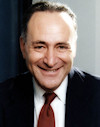 6/11/2008 - Sen. Schumer suggests return of Russia's hegemony in Central and East Europe... AHF (and Central and East European Coalition) sends letter and calls on community to express its concern. On June 3, 2008, Senator Schumer (D-NY) published an article in The Wall Street Journal entitled "Russia Can Be Part of the Answer on Iran." In this article, Sen. Schumer suggests that stronger economic sanctions would help deter Iran from developing nuclear weapons. The effectiveness of the sanctions, according to Sen. Schumer, will require Russia's cooperation. [read more] 6/11/2008 - Sen. Schumer suggests return of Russia's hegemony in Central and East Europe... AHF (and Central and East European Coalition) sends letter and calls on community to express its concern. On June 3, 2008, Senator Schumer (D-NY) published an article in The Wall Street Journal entitled "Russia Can Be Part of the Answer on Iran." In this article, Sen. Schumer suggests that stronger economic sanctions would help deter Iran from developing nuclear weapons. The effectiveness of the sanctions, according to Sen. Schumer, will require Russia's cooperation. [read more]
UPDATE: 7/25/2008 - American Hungarian Federation Participates in CEEC Meeting with Senator Schumer: Discusses Russia "Hegemony" statement.
[read more]
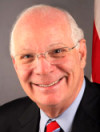 1/11/2013 - AHF again responds to Senator Ben Cardin, Co-Chair of the US Helsinki Commission. In his December 20, 2012 statement, the Senator was unfairly critical of Hungary. "...we are concerned that (1) your assertions concerning Hungary omit relevant facts; and (2) your statement fails to raise the discrimination and intolerant policies toward ethnic Hungarians in some of the countries bordering Hungary. The statement therefore leaves the impression... of bias, which could result in cynicism toward the Helsinki Commission and its valuable and necessary work." [read more] 1/11/2013 - AHF again responds to Senator Ben Cardin, Co-Chair of the US Helsinki Commission. In his December 20, 2012 statement, the Senator was unfairly critical of Hungary. "...we are concerned that (1) your assertions concerning Hungary omit relevant facts; and (2) your statement fails to raise the discrimination and intolerant policies toward ethnic Hungarians in some of the countries bordering Hungary. The statement therefore leaves the impression... of bias, which could result in cynicism toward the Helsinki Commission and its valuable and necessary work." [read more]
  7/22/2010 - AHF reacts to The Washington Post Editorial: "...the editorial, 'Hungary's Strongest Leader Targets the Media,' [July 19], seems to equate the prevailing sentiment in Hungary in support for minority rights and the new passport law with extremism. Nothing is farther from the truth." AHF letters reminded editors about the current extremism [see Slovak Language Law] in neighboring countries and explained that the legacy of Trianon continues to affect the lives of millions of ethnic Hungarians today. 7/22/2010 - AHF reacts to The Washington Post Editorial: "...the editorial, 'Hungary's Strongest Leader Targets the Media,' [July 19], seems to equate the prevailing sentiment in Hungary in support for minority rights and the new passport law with extremism. Nothing is farther from the truth." AHF letters reminded editors about the current extremism [see Slovak Language Law] in neighboring countries and explained that the legacy of Trianon continues to affect the lives of millions of ethnic Hungarians today. 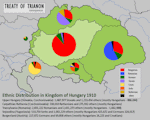 The letters also pointed out the fact that dual citizenship is a common and globally accepted practice even in those same countries that would discriminate against an ethnic Hungarian exercising his rights. AHF feels The Post missed the point and mixed unrelated issues. However, we appreciate the fact the The Post's editorial included a link to AHF's page on the Treaty of Trianon. The letters also pointed out the fact that dual citizenship is a common and globally accepted practice even in those same countries that would discriminate against an ethnic Hungarian exercising his rights. AHF feels The Post missed the point and mixed unrelated issues. However, we appreciate the fact the The Post's editorial included a link to AHF's page on the Treaty of Trianon.
Letters included those from members Frank Koszorus, Jr., AHF President; Bryan Dawson, AHF Executive Chairman; and Geza Cseri, former Science and Technology Advisor to the Allied Supreme Commanders of NATO. The Post published a Letter to Editor from Geza Jeszenszky, former Ambassador
to the United States and Foreign Minister.
All four letters appear in that order below:
Dear Editor:
Based on erroneous assumptions and a casual understanding of the challenges confronting Hungarians, the editorial, "Hungary's strongest leader targets the media," [July 19], seems to equate the prevailing sentiment in Hungary in support for minority rights and the new passport law with extremism. Nothing is farther from the truth. Consequently, the editorial appears biased and falls short of the high standard The Post sets for itself.
Dual citizenship is not uncommon in Europe and elsewhere. Romania, for example, grants dual citizenship to ethnic Romanians living in Moldova.
Remembering the Treaty of Trianon, which transferred over three million ethnic Hungarians to foreign rule, is neither polarizing nor a concern of only the right, as the editorial also suggests. Rather it is an issue today because some of Hungary's neighbors discriminate against their Hungarian minorities. Slovakia, which adopted a language law prohibiting the use of Hungarian in public, or Romania, which refuses to re-establish a former Hungarian university, are examples. If these countries respected minority rights, Trianon would be relegated to the history books.
Perhaps next time The Post will examine the facts a little more closely.
Frank Koszorus, Jr.
President,
American Hungarian Federation
---
Dear Editor:
I was confused by the editorial, "Hungary's strongest leader targets the media," [July 19]. The merits (or lack thereof) of government media controls has little or nothing to do with passports or citizenship which are matters of national identity, not nationalism. Dual-citizenship is a common practice throughout the world as is autonomy and respect for local, historic communities. Is the U.S. nationalist for allowing Americans to live abroad and keep their passports? Is the US extreme for accepting dual citizenship with Britain, France or Mexico? Is Hungary extreme for accepting dual citizenship for ethnic Slovaks living in Hungary? Slovakia accepts dual citizenship for some, but will not extend the same rights to ethnic Hungarians who have lived in their own communities for over 1,100 years. As such, it is clearly discriminatory. Unfortunately, the law to rescind Slovak citizenship for ethnic Hungarians who exercise their right to apply for Hungarian citizenship on Saturday, July 17, 2010.
Is the concern for the basic human rights of an ethnic minority an extremist, extreme right-wing position? Are Catalonians extreme for wanting to speak Catalan with the postman in Catalonia? How about speaking French in Quebec? Spanish in Miami? Italian in Switzerland? Slovakia, under a truly nationalist government that include Jan Slota who called Hungarians, “the cancer of the Slovak nation,” passed a law making it illegal to converse in Hungarian with a Hungarian postman in a post office in an 1100-year old Hungarian village.
For the 40 years of communist rule, it was taboo to discuss topics such as Trianon and asserting rights for ethnic minorities as to not disturb the “socialist brotherhood of nations.” Does the Post long for the brotherhood’s return? As the link you provided explained so well, any objective observer would see Trianon as a huge miscarriage of justice that continues to affect the lives of millions today. It is not a right-wing, extremist issue, it is an issue of human and minority rights that should transcend the political spectrum. The firm re-establishment of democracy in Hungary allows for a full examination of these topics, however uncomfortable for the West who bears the responsibility for creating these minorities and ethnic strife in the first place.
Bryan Dawson
Arlington, VA
---
Dear Sir:
As a 40+ years subscriber to The Post, and a member of the American Hungarian Federation, I would like to response to your Editorial: "Hungary's strongest leader targets the media," [July 19], is based on erroneous assumptions and little understanding of Hungary’s history and psychic. Equating Hungary’s support for Hungarian minorities and of the granting of dual citizenship as being chauvinistic and catering to extremism is further from the truth. Granting dual citizenship is a common practice. The neighboring countries Romania, Slovakia, Czech Republic grant dual citizenship to their ethnic brothers living in neighboring countries. One example is Romania granting dual citizenship to ethnic Romanians living in Moldova. The fact that The Post never raised this issue before regarding the named countries why now when it comes to Hungary? Am I wrong if I detect a bias attitude in this?
When it comes to the Treaty of Trianon, you are telling to the Hungarians to forget it. How can you forget that your arms and legs are cut off, and millions of your brothers are under foreign rule, because that is what happened at Trianon. The Treaty unjustly, with malice, deprived Hungary of 65% of her inhabitants and 72% of her territory, an area as large as Illinois, Indiana, and Ohio or Kentucky combined. The dismemberment also created 16 million ethnic minorities, including millions of Hungarians. This treaty totally altered the political balance of Central Europe which then led to the Balkanization of the area and created the political and economy hardships and turmoil to the country and the area. There are no extremists on this issue since practically the whole nation laments the injustice of Trianon.
If there is revisionalism in Hungary, it is fueled by Slovakia, Romania, Ukraine and Serbia because of their oppressive and discriminatory policies. Slovakia, by the Benes Decrees and its language law prohibiting the use of Hungarian in public, or Romania, which refuses to re-establish a Hungarian university, or the continuous physical beatings of ethnic Hungarians by the Serbs in Voivodina are examples.
I hope that in the future, The Post will be more mindful of the facts and reality.
Geza Cseri
Mc Lean VA
President, CIC, Inc. and
former Science and Technology Advisor
to the Allied Supreme Commanders of NATO
---
An unfair portrayal of Hungarian politics - 7/24/2010
[see original Letter to the Editor]
The July 19 editorial "Hungary's rightward lunge" was as inaccurate as it was unfair. It also revealed a superficial understanding of Hungary and Fidesz, the party that just won a landslide victory in the parliamentary elections this spring. A few examples:
In 2002, Hungary's prime minister, Viktor Orbán, did not cater to "Hungary's extreme right," as the editorial stated, but successfully opposed it and helped oust its representatives from parliament by defeating them during the elections.
Although Washington did not welcome Hungary's decision to purchase fourth-generation Swedish-British Gripen fighter planes rather than used American F-16s, it did not make Mr. Orbán persona non grata and a pariah, as the editorial suggested. In March 2002, President George W. Bush telephoned Mr. Orbán and invited him to visit the United States following the elections, which looked like an almost certain victory for Mr. Orbán's Fidesz Party.
As a staunch friend of the United States and an appreciative reader of The Post, I hope that the editorial policy relating to Hungary will be more balanced and factual in the future.
Géza Jeszenszky, Budapest
The writer was Hungary's ambassador to the United States from 1998 to 2002.
- April 29, 2003 - US Senate Testimony: "NATO Enlargement: Promoting Western Values, Strengthening the Alliance." Calling attention to minority protections. before the United States Senate Committee on Foreign Relations.
- March 25, 2009 - US Senate Reception on the Occasion of the Policy Reception in Honor of NATO and Its Enlargement - : Remarks of Frank Koszorus, Jr.
- April 2009 - CEEC statement on NATO Enlargement and Supporting the Open Door Policy.
- July 2007 - Hungary's Accession to NATO: An expanded report by Frank Koszorus, Jr.
- October - November 1997: The Debate on NATO Enlargement:
Hearings Before the U.S. Senate Committee on Foreign Relations. Testimony of Frank Koszorus, Jr., President, AHFDC. An interesting exchange with Sen. John Kerry.
- June 20, 1996 - U.S. Policy Toward NATO Enlargement: Hearing before the Committee on International Relations,
United States House of Representatives 104th Congress, Second Session: Testimony of Frank Koszorus, Jr., President, AHFDC.
- June 2007 - Hudson Institute Panel: Enduring Strains of Communism
in Central and Eastern Europe
- March 29, 2004 - On the Occasion of NATO Expansion, Corcoran Gallery of Art. AHF Remarks by Frank Koszorus, Jr.: NATO
Enlargement and Minority Rights
- October 24, 2003 - AHF Memorandum on Romanian President Iliescu Visit
Key Dates in Hungarian-American Diplomatic Relations: Diplomatic relations between Hungary and the United States were formally established in 1922, although unofficial contacts have been present ever since the War of Independence. Colonel Commandant Michael Kováts, a Hungarian nobleman is regarded as the founder of the American Cavalry, and was one of the first heroes to lay down his life for American independence near Charleston, South Carolina. Friendly relations between the two nations were further enhanced through Lajos Kossuth’s visit to the United States in 1851 – whose bust is one of the few foreign nationals present in the Capitol Rotunda. Kossuth was the second foreign national – after the Marquis de LaFayette – ever to be given the honor of speaking before a joint session of Congress. |



